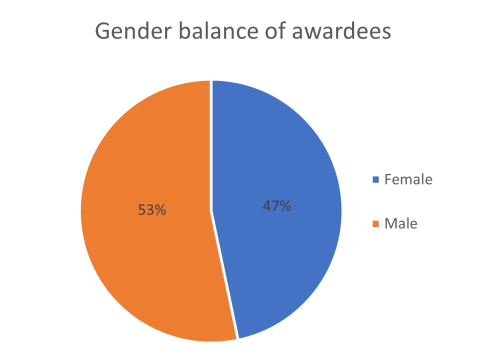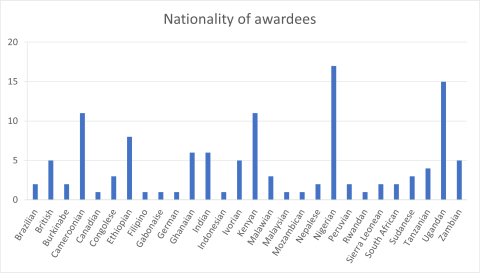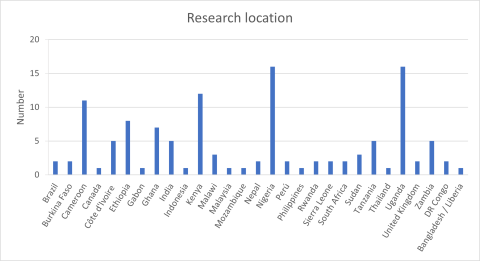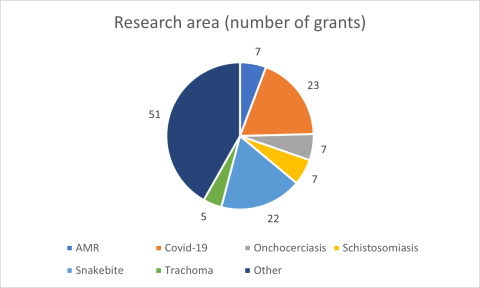2020 Small Grants round-up
We have now awarded all the grants for the 2020 Small Grants Programme. This has been another record-breaking year, as we were able to award 122 early career research grants to researchers and professionals across the world.
In 2019, we awarded 50 grants, so this represents an increase of 144%. This has been made possible through the generous support of our partners: Department of Health and Social Care via the National Institute for Health Research, Wellcome Trust and the International Trachoma Initiative.
RSTMH small grants often represent the first opportunity for this group of researchers to lead their own research and showcase the results through presentations or publications. We hope the results of their research would enable some of our cohort to leverage additional follow-on funding.
As in previous years, we will keep in touch with this cohort and look forward to their exciting research outputs as they deliver their progress reports. Currently, we are eagerly awaiting the results of the 2019 small grants research projects and to see what a difference the grants have made to their careers.
Providing over twice as many awards than last year is a great achievement for RSTMH, thanks to our partners. However, we are still a long way from us being able to award every application for research that is judged as high quality and fundable. This year, we had a total of 282 grants that fell into this category, and we have 160 people who have not been matched to funding. If you know any individual or institution who may be interested in helping fund a small grant, please do get in touch with us.
Thank you to our Global Assessors
The job of assessing applications is in the hands of our network of Global Assessors, whose role is to review the applications and provide detailed assessments. Each application is reviewed by at least two Assessors, who give their time to provide this important quality review.
We would not have been able to deliver our small grants programme without their support and so we would like to thank them for all of their time and dedication in collectively carrying out over 1,600 assessments.
We wanted to share some more detailed analysis of the awardees, including the gender split, thematic areas, countries where research will be carried out and where our researchers are based, and a little more detail on the awardees themselves.
Gender

The gender split of the 932 applicants was 60% male, 40% female. For grant awardees it has narrowed to 53% male and 47% female. The gender balance is an improvement on the 2019 cohort which was 60% male and 40% female.
Research location and nationality of awardees

The 2020 grant awardees represented 28 countries. Of these, 82% of recipients were from across Africa. The country with the highest number of recipients is Nigeria (17), followed by Uganda (15) and Cameroon and Kenya (11 each). In 2019, UK nationals were the only Europeans to receive small grants. This year, there were five grants to those of UK nationality and one grant to an awardee of German nationality.

Research areas

We received more than 70 applications on COVID-19-related projects and these projects were the highest number awarded (23) followed closely by snakebite projects (22 awards). There were seven awards each in the areas of antimicrobial resistance (AMR), onchocerciasis and schistosomiasis. We awarded grants across our priority areas including NTDs, malaria and planetary health. We also awarded grants in areas of multi-morbidity such as onchocerciasis alongside type 2 diabetes.
Given the emergence of COVID-19 earlier this year, we were very pleased to see so many COVID-19 project applications and this disease topic has translated into the highest number of awards cutting across a range of areas, including seroprevalence, behaviour, shielding and service delivery. With a huge amount of global research ongoing in this space and as our knowledge evolves, we hope to see more applications submitted to our 2021 programme.
Snakebite envenoming has been historically an under researched and under-resourced NTD. It kills between 81-138,000 people annually and leaves many more people with long-lasting disabilities[1]. It is estimated that between 2008-17, only $57m was invested in research globally[2]. As a comparison, £230m was spent on cancer research in the UK alone, in 2018/19[3]. With the help of RSTMH and many of our partners, the profile, funding and awareness of snakebite envenoming has increased in recent years. In 2019, the WHO launched its global strategy for prevention and control of snakebite envenoming and the Wellcome Trust announced an £80m programme into snakebite research[4]. With our partners, we are delighted to award 22 grants in this long-neglected disease. The third International Snakebite Awareness Day on 19 September 2020 provides an opportunity to remind ourselves of the challenges of tackling snakebite and also to showcase women on the frontline of this issue.
AMR is a global problem. Increasing resistance to our current suite of antimicrobials can lead to routine procedures becoming very high risk, as without effective drugs, the risk of infection increases. There are at least 700,000 deaths every year due to drug-resistant infections and it is estimated that this will increase to 10m by 2050[5]. The grants we have awarded include research on the assessment of antibiotic prescribing patterns, AMR strategies and economic evaluation in LMICs, and AMR policy implementation.
2021 Small Grants Programme
We are already planning the next round of our small grants programme, which we will open in early 2021. We would like to encourage early career researchers and other professionals globally and across all relevant disciplines to apply next year. We fund grants across the research spectrum from basic research to policy research and across all areas of tropical medicine and global health.
Watch this space for more news on the 2021 Small Grants Programme over the coming months.
References
[1] https://www.who.int/news-room/fact-sheets/detail/snakebite-envenoming
[2] https://wellcome.org/sites/default/files/global-funding-for-snakebite-en...
[3] https://www.ncri.org.uk/trends-in-disease-site-spend/
[4] https://wellcome.org/press-release/snakebites-%E2%80%93-its-time-solve-w...
[5] https://www.who.int/antimicrobial-resistance/interagency-coordination-gr...